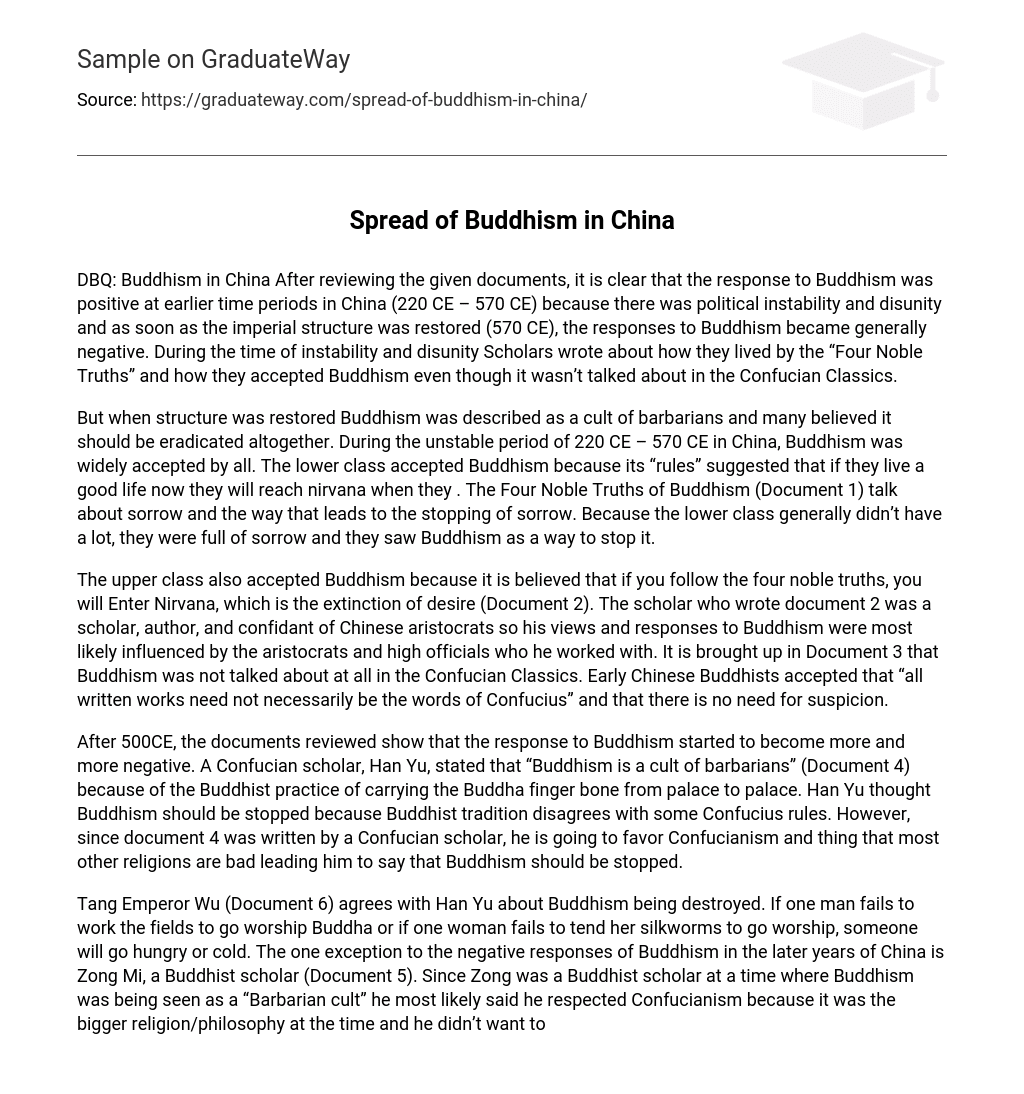DBQ: Buddhism in China After reviewing the given documents, it is clear that the response to Buddhism was positive at earlier time periods in China (220 CE – 570 CE) because there was political instability and disunity and as soon as the imperial structure was restored (570 CE), the responses to Buddhism became generally negative. During the time of instability and disunity Scholars wrote about how they lived by the “Four Noble Truths” and how they accepted Buddhism even though it wasn’t talked about in the Confucian Classics.
But when structure was restored Buddhism was described as a cult of barbarians and many believed it should be eradicated altogether. During the unstable period of 220 CE – 570 CE in China, Buddhism was widely accepted by all. The lower class accepted Buddhism because its “rules” suggested that if they live a good life now they will reach nirvana when they . The Four Noble Truths of Buddhism (Document 1) talk about sorrow and the way that leads to the stopping of sorrow. Because the lower class generally didn’t have a lot, they were full of sorrow and they saw Buddhism as a way to stop it.
The upper class also accepted Buddhism because it is believed that if you follow the four noble truths, you will Enter Nirvana, which is the extinction of desire (Document 2). The scholar who wrote document 2 was a scholar, author, and confidant of Chinese aristocrats so his views and responses to Buddhism were most likely influenced by the aristocrats and high officials who he worked with. It is brought up in Document 3 that Buddhism was not talked about at all in the Confucian Classics. Early Chinese Buddhists accepted that “all written works need not necessarily be the words of Confucius” and that there is no need for suspicion.
After 500CE, the documents reviewed show that the response to Buddhism started to become more and more negative. A Confucian scholar, Han Yu, stated that “Buddhism is a cult of barbarians” (Document 4) because of the Buddhist practice of carrying the Buddha finger bone from palace to palace. Han Yu thought Buddhism should be stopped because Buddhist tradition disagrees with some Confucius rules. However, since document 4 was written by a Confucian scholar, he is going to favor Confucianism and thing that most other religions are bad leading him to say that Buddhism should be stopped.
Tang Emperor Wu (Document 6) agrees with Han Yu about Buddhism being destroyed. If one man fails to work the fields to go worship Buddha or if one woman fails to tend her silkworms to go worship, someone will go hungry or cold. The one exception to the negative responses of Buddhism in the later years of China is Zong Mi, a Buddhist scholar (Document 5). Since Zong was a Buddhist scholar at a time where Buddhism was being seen as a “Barbarian cult” he most likely said he respected Confucianism because it was the bigger religion/philosophy at the time and he didn’t want to be threatened. They differ in their approaches in that they encourage the perfection of good deeds, punish wicked ones, and reward good ones. ” Zong was probably one of the few during this time that respected each religion as its own. All of the documents are written by Scholars or high officials except for document 1, and therefor don’t show the responses of the lower class on Buddhism. Without this, it is difficult to tell if Buddhism was accepted by the peasants and since the lower class or peasants were a huge part of China, it is hard to understand fully the responses of Buddhism to all of China.
It would have been helpful to have a document written by a lower class or peasant to see if they responded differently to Buddhism then the upper class or scholars. Buddhism had both negative and positive responses in China. However, in general, the responses were more positive and accepting of Buddhism during the earlier period and negative and hateful during the later period. But through both the earlier and later periods of China, when Buddhism was accepted and when Buddhism was frowned upon, it has survived till this day.





